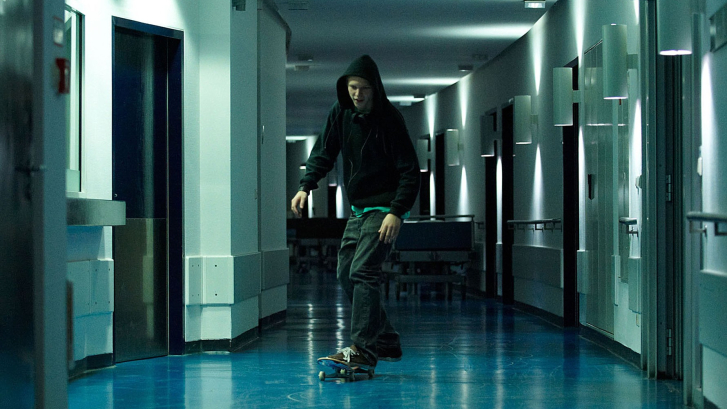Swans

A father and his teenage son travel to Berlin. The boy has never met his mother who is in hospital in a coma. The father is confronted by his uncertain past. Both are unsettled by the winter gloom in the unfamiliar big city, and by the hostile environment of the hospital. The mother’s flat where both are staying is equally unwelcoming. They meet a mysterious and beautiful woman there, the mother’s flat mate. While the boy explores the city, the father waits for the mother to recover. The film evokes an atmosphere oscillating between desire and anonymity, the fear of personal proximity and of death, between boredom and physical excess on a skateboard. It presents an unusual impression of Berlin, involving a fascinating coming-of-age story and of facing up to old age. It is a haunting exploration of the many facets of love and desire.
----
A man travels to Berlin because his ex-girlfriend is in a coma. He has brought their son Manuel with him. The two stay in the ailing woman’s apartment. While his father makes frequent visit to the clinic, Manuel feels out of place there. He prefers to wander through the wintry city on his skateboard.
It is an immobile, mute body that serves as the focal point of the film: the body of a comatose woman. A body between lifeand death, which induces unease and insecurity in both father and son. They, too, function primarily as bodies. Bodies (almost) without language, which are unable to relate to one another. The son is preoccupied with the libidinous upheavals of adolescence. The father has age-related physical complaints. Thus: there is skateboarding, masturbating and loud Berlin rap music for the one, gentle relaxation techniques and televised sports for the other. And then there is the body of their flatmate Kim, whose personal items serve as fetishes for Manuel and who awakens sexual desire in him. A somatic film. In other words: a masterfully orchestrated confrontation of diverse body images with a climate of emotional distance and the chill of the city.
Birgit Kohler
The bodies’ secrets
SWANS was written in the first year I spent in Berlin and is indelibly linked to this city. There are several themes in the film, but I’d like to talk about one in particular, which was probably the first impulse for writing it, linked to a previous personal experience, a remote memory, but one which re-emerged at that time, perhaps as a result of a long and lonely winter.
Cristina, as my friend was called, suddenly fell into a coma due to a prolonged illness. In the early days of visiting, I remember the ochre tones of the hospital, the smell of chemotherapy, wary doctors reeling off palliative instructions, but above all the silence of the lethargic bodies. Amid this inhospitable environment, when I was facing her for the first time, I unceasingly looked for a familiar point on which any hope of recognition could be based. But her eyes were absent, lost at a point beyond me, cloistered in their distance. Touching the skin of her body for the first time, I recognized neither the temperature nor the texture. However, this touch produced a vibration between me and something else I couldn’t identify. Was this death? The doctors claimed, using the powerful logic of techno-science, that “coma” means the complete loss of consciousness, that all movements are “reflex” and not “conscious,” that the body has no nerve reactions, and makes little or no reaction to external stimuli. When I summoned up the courage and decided to massage this body for the first time, trying to relax the enormous muscular tension, the paradox arose, brutal and unexpected: If this “thing” was dead, it seemed brutally alive in my hands. Confusion set in: How to deal with this idea? It was clear there was still a long way to go, something new to grasp.
This search was abruptly interrupted by her death. However, this paradoxical feeling always stayed with me. Much later, I thought the ceaseless search for explanations might not be the right way. I think this kind of borderline experience leads us back to ourselves and it is probably in this movement that everything is defined – because the death of those who are closest to us is an intimate death that touches us at the deepest level; and indeed, when we begin to see what death really means, our gaze is thrown back inside, into our own depths. It is intimate because it puts us closer to our own feelings. And it is particularly complex in a society that buries and avoids this introspection as far as possible. This inwardness, this path to follow, the difficult path to intimacy is one of the key issues in SWANS. How to deal with and accept something that has no answer? How to deal with the body, the other and death? What is a relationship between bodies, I mean also those who are not yet in a coma: friend, father, son, mother?
Hugo Vieira da Silva
details
-
Runtime
126 min -
Country
Germany -
Year of Presentation
2011 -
Year of Production
2011 -
Director
Hugo Vieira da Silva -
Cast
Kai Hillebrandt, Ralph Herforth, Maria Schuster, Vasupol Siriviriyapoon -
Production Company
Flying Moon Filmproduktion, Berlin -
Berlinale Section
Forum -
Berlinale Category
Feature Film
Biography Hugo Vieira da Silva
Hugo Vieira da Silva was born on July 16, 1974 in Porto, Portugal. After studying law at the Catholic University in Porto, he earned a degree from the Lisbon School of Theater and Cinema (ESTC) in 1998 with his graduation project, the documentary Arte Pública. Da Silva made two other documentaries before directing his first full-length feature film, Body Rice, in 2006. Swans is his second full-length feature film. Hugo Vieira da Silva currently lives and works in Vienna and Berlin.
-berlinale.de